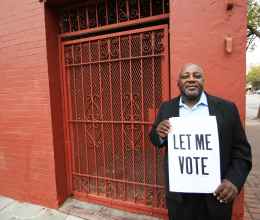FOR IMMEDIATE RELEASE
September 9, 2019
Press Contact:
Daisy Vieyra, dvieyra@acluca.org, 916-824-3266
Ashley Chambers, ashley@ellabakercenter.org, 510-417-6071
Sacramento, CA – Today, the California Senate voted to pass AB 45, state legislation introduced by Assemblymember Mark Stone (D-Monterey Bay) to eliminate copays for medical and dental services provided in California county jails. The bipartisan vote follows the decision by the California Department of Corrections and Rehabilitation (CDCR) to voluntarily eliminate copays in state prisons earlier this year, citing public health concerns. AB 45 would make the CDCR’s decision permanent by codifying it into state law.
“Fair and just access to healthcare is a human right,” said Eric Henderson, Policy Director with Initiate Justice. “Copays are dangerous barriers to healthcare access that force incarcerated people into a risky waiting game and ultimately undermine public health throughout the state. It’s time California jails stop charging copays once and for all.”
Living in close quarters and crowded environments puts incarcerated people at heightened risk of illness and contagion. As a result, charging copays for fundamental medical and dental care jeopardizes not just the health of those who are incarcerated, but also of staff, volunteers, and family and friends who visit the facilities. Indeed, in 2003, the Centers for Disease Control and Prevention identified copays as one of the factors contributing to a MRSA outbreak among incarcerated people in California.
“I made 8 cents an hour at my kitchen job but was still required to pay a fee to see the doctor,” says Taylor Lytle, a formerly incarcerated organizer with the California Coalition for Women Prisoners. “When I was sick, I had to choose between seeing a doctor and buying hygiene I needed, like soap.”
Most county jails in California charge incarcerated people a $3 copay for medical, mental, or dental care. Jails are also allowed to charge for medical equipment, including glasses and dentures. The costs can be unaffordable and deter many incarcerated Californians from seeking care, oftentimes until their condition escalates to emergency status. Due to labor exploitation, incarcerated people currently earn only pennies per hour, with a majority earning less than $25 a month.
Additionally, because of the overrepresentation of Black and brown people in California’s criminal justice system, a lack of access to necessary health care only exacerbates existing health disparities in these communities.
“By eliminating jail and prison copays, AB 45 will help improve public health and bring California one step closer to establishing more just access to healthcare for incarcerated Californians,” said Emily Harris, Interim Policy Manager with the Ella Baker Center for Human Rights. “This is particularly important to achieve equitable health outcomes in Black and Brown communities, and reduce the financial burden on incarcerated Californians and their families.”
AB 45 now heads to the governor’s desk for his signature.
FOR MEDIA INQUIRIES
Email media@aclu-sdic.org






